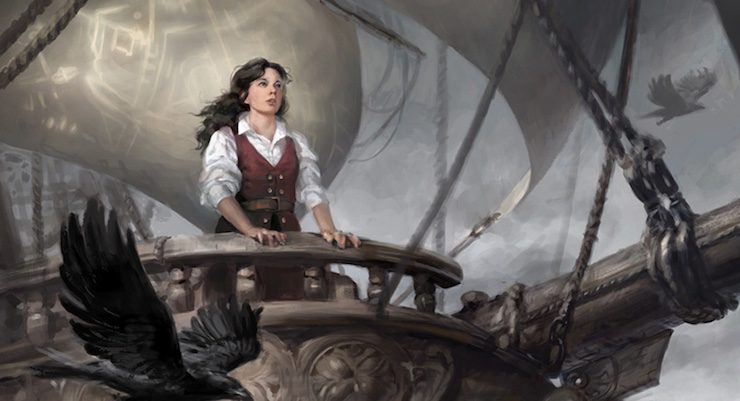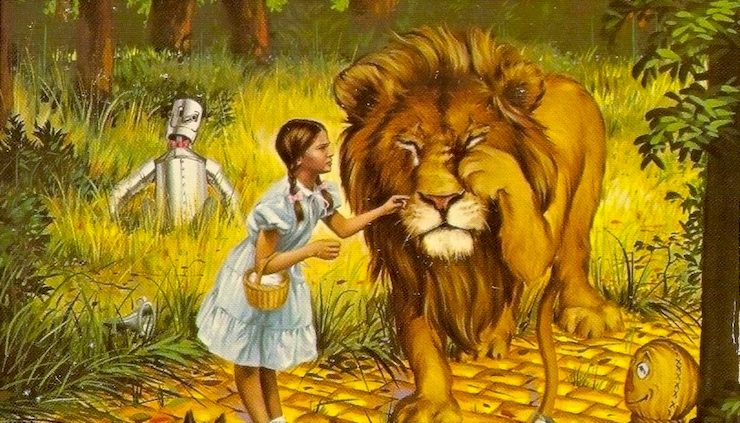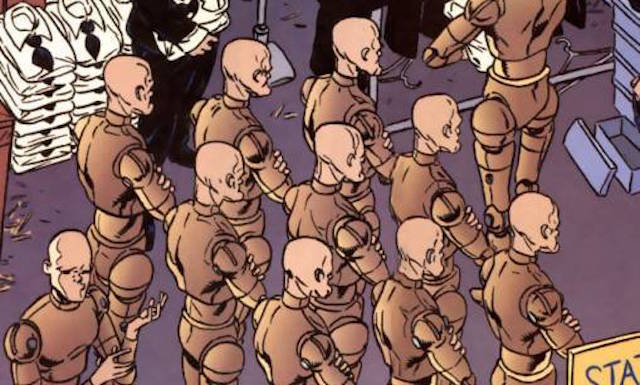Sure, this fairyland has magical feasts, beds made of starlight, and laundry that does itself, but maybe a good communication network would help it avoid constant warfare?
When someone from our time falls through a portal into a fantasy world, it can be fun to imagine just what you would do in the same circumstance. How could you use your smartphone? Would you try to introduce germ theory?
Often the characters in these portal world stories voice the same considerations. Here are five instances (for good or ill) where people from our world tried to introduce modern-day thinking to a fantasy world.
The Wizard of Oz by L. Frank Baum

The usually-peaceful fairy land of Oz has developed some big problems by the time of Dorothy’s arrival, and while she proves to be a remarkable catalyst for change before she even steps on the ground (Accidentally eliminating half of the evil power arresting the land will do that.) it’s the machinations of the very human Wizard that first initiated the shift in the fortunes of Oz. Aviation science brings the Wizard into Oz and because he can fly (well, float off course) he immediately thinks himself superior to the non-technological denizens, readily accepting a role as their savior and ruler.
As we see, simply following the instruction manual for your hot air balloon doesn’t mean you know how to maintain the balance and safety of an entire country. Dark witches fill the power vacuum, and ultimately the peoples of Oz are forced to huddle inside the walls of the Emerald City just to feel safe. Not that one would feel all that safe when your ruler is a booming, flaming charlatan who avoids governing.
It’s quite a cautionary tale. Just because you’re from a more technologically advanced world doesn’t automatically mean you’re qualified to wield power in a less technologically advanced world.
A Daughter of No Nation by A.M. Dellamonica

Sophie Hansa has barely returned to Earth after discovering the existence of Stormwrack before she’s itching to return to this alternate world of island nations governed by the mighty Fleet. But despite Sophie’s many messy personal and legal ties to the magical land of her birth, she is forbidden to learn anything about Stormwrack: Her cameras and other devices from “Erstwhile” are confiscated, and she is denied access to books or people who could provide any information about Stormwrack’s geography, politics, culture, you name it.
Cut off from any way of absorbing information, Sophie decides that her best chance is to give information by importing ideas—specifically, the scientific method and criminal forensics as learned from television procedurals. As Dellamonica explains, Sophie’s experience as a wildlife biologist coupled with her fannish tendencies makes her the perfect conduit to pass along revolutionary thinking:
In our world, it would be disastrous for an ordinary civilian to try to apply dumbed-down TV-style detective procedures to real-world crimes. But Stormwrack is a world apart, and it’s one where most of the people don’t have the mental habit of analytical reductionism (approaching a new phenomenon by mentally breaking it into components, and then pushing them around to see how they might be understood). Sophie doesn’t have to have years of training in the physics of analyzing blood spatter. She just has to pass on the idea to a motivated cop. Even the concept of preserving a crime scene is every bit as radical, on Stormwrack, as double-entry accounting was to [L. Sprague] de Camp’s ancient Rome. It was a radical idea here, too, at one time. Now it’s just standard procedure.
In an attempt at bonding, Sophie’s biological father, chief Duelist-Adjudicator, invites her to put these otherworldly notions into practice by setting up an entire forensic institute to work with the Fleet’s judicial system—introducing everything from proper crime scene etiquette to fingerprinting. But what begins as a self-serving way to gain the yearned-for access to Stormwrack’s history and secrets becomes something very different when Sophie learns to solve seemingly impossible cases with Erstwhile methods.
The Magician King by Lev Grossman
Grossman’s Magicians trilogy skirts this idea a bit, seeing as most of the problems that occur in the magical world are first caused by the protagonists, then fixed. Quentin, Janet, Eliot and Julia get to spend their time ruling as Kings and Queens of the magical Fillory, but earlier activities by Julia and the Murs resulted in an awakening of the old gods—who are now returned to close the loophole that allowed access to magic. Because Fillory itself was the product of that loophole, the end of magic will destroy Fillory. Luckily, the founders of the Neitherlands (the city between worlds) created a sneaky back door so that magic could remain if the old gods ever returned to do just that; all our heroes need are seven golden keys to said door. After much questing, they find the keys and open the door, allowing magic back in. Quentin takes on Julia’s debt for bringing the old gods back in the first place and gets banished from Fillory for his trouble, but at least the world is safe.
The characters in the series stomp into Fillory as over-achieving, hyper privileged college students who have always been the best in everything they tried, and have no idea what it’s like to be told “no”. And while that’s not really a “modern” mindset, there are uncomfortable elements of pop culture nostalgia in the way they approach Fillory as something that should be tinkered with to suit their whims. It’s an interesting play on the trope of the “purity” of children. Quentin and company have adult wants, but are emotionally and cognitively immature, and the imbalance really wrecks with the fantasy world of Fillory.
Fables by Bill Willingham and Mark Buckingham
The Fables comic book series is an interesting subversion in that it’s actually a homegrown denizen of the Homelands (the catch-all term for every fairy tale land that has ever existed in fiction and myth) who ruins everything by imposing modern-day authoritarianism powered by industrial production. This pushes lots of recognizable characters into our world—like Snow White, the Big Bad Wolf, Pinocchio, Prince Charming—who are then forced to adapt to modern times.
The speed in which they master their new reality is impressive, and the exiled Fables end up learning so much that they are able to retake their vast Homelands through a synthesis of modern tactics regarding warfare, economics, and representative government. That, of course, brings its own problems, and offers some stark reminders that the arrogance of the new world can still leave one vulnerable to the terrors of an old world.
The Amber Spyglass by Philip Pullman
The His Dark Materials series is notable for going to great lengths to prove that cooperation and shared knowledge between realities is the key to achieving a greater understanding of cosmology, consciousness, and the self. In The Amber Spyglass, scientist Mary Malone kicks off the ending to the series through her determination to help the new parallel reality that she has become a part of. Her approach is resolutely scientific: she makes observations, forms a question, proposes a hypothesis, runs an experiment, and reaches a conclusion. All while a bunch of snouted deers with wheels for feet zip around her. Where the series heroine Lyra would rely on intuition and reflex to solve a problem, Mary relies on objectivity and analysis. The day is saved only when the two methods of understanding combine. Mary’s conclusion, that Dust is required for conscious life and that it is moving away from all worlds, spurs Lyra’s intuition, that the Dust is draining out through holes in reality that she and Will have created, provides a clear solution that allows our heroes to not just save their world, but ALL worlds, including our own.
It’s a sneaky triumph. His Dark Materials proves that no one person ever has the entire answer and that respectful collaboration can change lives significantly for the better.














Thomas Covenant has no belief in the fantasy world he finds himself in, and makes some serious errors that he spends the rest of the series compensating for and dealing with the consequences of. (“Lord Foul’s Bane” by Stephen R. Donaldson)
The first book in DJ MacHale’s Pendragon series.
Not quite what you mean, but several Discworld books feature ideas about inventions and cultural things from our world leaking into the minds of people in that world and wreaking havoc.
Again, not quite what you meant, but definitely some similar themes: A Connecticut Yankee in King Arthur’s Court by none other than Mark Twain himself, in 1889. Come on now…gotta give credit where credit’s due.
Lost Regiment by Harry Turtledove. Yankees disrupt the previous order (not that being bred as food for huge beasts sound like tons of fun, but anyhow), within a few decades they’ve gone from 14th century farmlands to steam powered gatling guns and air battles.
The second part of The Neverending Story, where Bastian finally gets into the Book’s world and proceeds to mess up (and get messed up) bigtime. He’s as much victim as culprit, mind – the world of Fantastica has a decidedly predatory relationship with its occasional “guests”.
How about the time when Narnia is being created and Humans bring Jadis? Yes, they sort of fix things up but only for a time.
Okay, not technically Fantasy. In Charlie Stross’ “Merchant Princes” series, two worlds get drastically changed.
*SPOILERS*
One gets a nuclear winter, another a socialist revolution